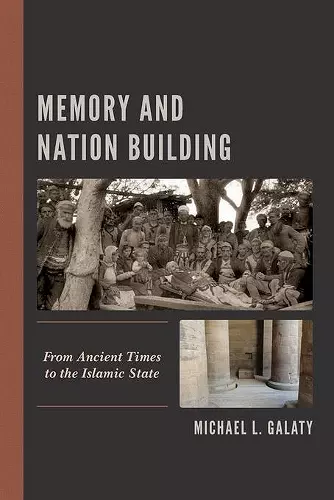Memory and Nation Building
From Ancient Times to the Islamic State
Format:Paperback
Publisher:Rowman & Littlefield
Published:8th May '21
Currently unavailable, and unfortunately no date known when it will be back
This paperback is available in another edition too:
- Hardback£99.00(9780759122604)

Memory and Nation Building addresses the complex topic of collective memory, first described by sociologist Maurice Halbwachs in the first half of the 20th century. Author Michael Galaty argues that the first states appropriated traditional collective memory systems in order to form. With this in mind, he compares three Mediterranean societies – Egypt, Greece, and Albania – each of which experienced very different trajectories of state formation. Galaty attributes these differences to varying responses to collective memory in all three places through time, with climaxes in the Ottoman period, during which all three were under Ottoman control. Egypt was characterized by deeply meaningful memory tropes concerning national unity, which spanned all of Egyptian history, while Greece experienced memory fragmentation, a condition exacerbated by periods of imperial conquest. Albania adapted and assimilated when faced with foreign domination, such that an indigenous Albanian state did not form until 1912.
Galaty builds a diachronic model of state formation and its relationship to memory and political control. Memory and Nation Building culminates in an analysis of modern collective memory systems and resistance to those systems, which are often framed as conflicts over “heritage”. The formation and eventual fall of the short-lived Islamic State serves as an example of extreme memory work, with lessons for other modern nations.
In this lucid, sweeping monograph, Galaty (Univ. of Michigan) argues that collective memories are a necessary component of human cultural behavior, and, moreover, that they are the most crucial element of state formation and nation building. * CHOICE *
What is most significant about Galaty’s ambitious and highly readable book is that he takes a comparative and long-term diachronic approach to collective memory practices. . . . Memory and Nation Building is. . . a compelling book and an excellent example of how the archaeological study of memory has matured over time. It will be of interest to scholars involved in the study of memory, the relationship between memory practices and the longue durée, and comparative approaches to history.
* American Journal of Archaeology *Galaty (2018), moves the study of collective memory beyond a simplistic association between monuments and legitimacy, following Jonker (1995) and J. Assman (2011) to develop a model that explains how would-be leaders transformed individual memory (particularly from funerary contexts) into collective memory.
* Annual Review Of Anthropology *Galaty’s aims are laudable, and I respect the breadth of the scholarship on display here. . . . Galaty is sincere about deploying the craft of archaeology to make sense of the violence and upheaval in our times. Colleagues of a processual bent who value large-scale comparative studies and who study the rise of states, nationalism and memory may well find much to interest them here.
* Cambridge Archaeological Journal *Memory and Nation Building is a hugely ambitious and ultimately convincing narrative of the tight bonds between memory, social formation, and ultimately of state building. Few authors have attempted to connect deep prehistory to the present in a single region of the world, much less three. Beautifully written, deeply researched, and often surprising, scholars in many fields will find Galaty's new theorization of memory convincing and useful. -- Wayne Lee, Dowd Distinguished Professor of History, University of North Carolina
In Memory and Nation Building, Michael Galaty reveals the pervasiveness of memory work in society through a series of well researched diachronic case studies. His prose is both erudite and accessible, making this book essential reading for scholars and students in all walks of the Social Sciences and Humanities. -- Robert Schon, Associate Professor of Anthropology, School of Anthrpology Associate Director (Academic Affairs), Director of Graduate Studies, The University of Arizona
- Winner of Skendi Book Prize from the Society for Albanian Studies 2019
ISBN: 9781538158388
Dimensions: 220mm x 154mm x 12mm
Weight: 308g
224 pages